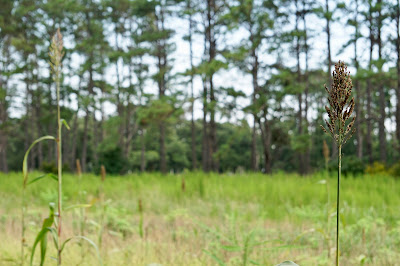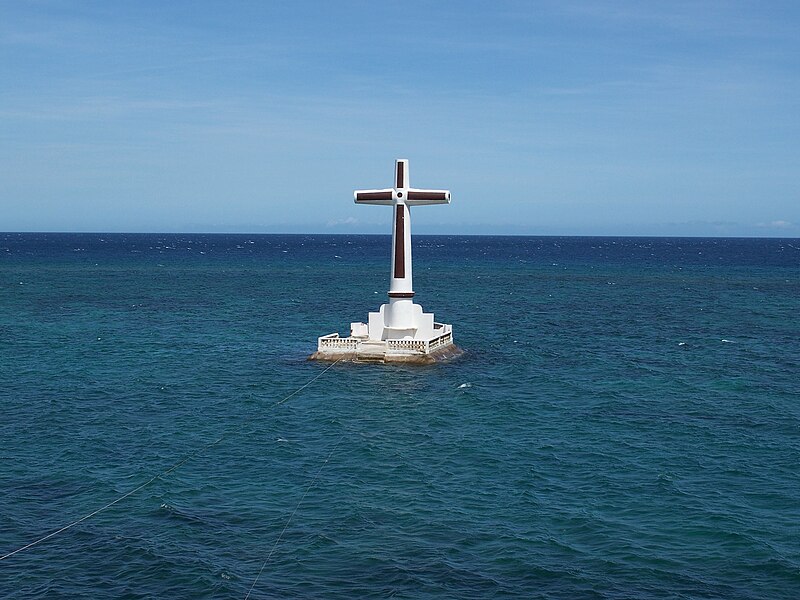Romans 8:12-25 and Matthew 13:24-30, 36-43
This past Tuesday I woke to find The Post and Courier, a local Charleston, South Carolina paper, on the doorstep of the vacation condo we were staying in.
I skimmed the headlines before I started reading, and on the front page I read, “Confronting the Invaders: As South Carolina battles invasive plants on coast, study ties them to people, and wealth.”
The article discussed invasive species of plants that are choking out the native fauna that sustain the marsh and coastline ecosystem of that region.
Supposedly, these plants have been introduced to the region by residents using these invasive species to decorate and beautify their own property.
But those plants have grown beyond their control and have literally rooted themselves into the marshes and beaches, harming species up and down the food chain along the coast.
I had begun working on the text before traveling out of town and I couldn’t help but find myself haunted by today’s gospel throughout my vacation in light of the headline I read that morning.
And not just the headline or today’s text, but the history of that sleepy little island named Edisto, oftentimes called “Edislow” for the laid back nature of the town and its residents.
That island’s main source of income today is tourism, but the settlement of that seacoast island has a firm foundation in one of the earliest examples of the plantation economy of the south.
Early planters nearly stripped the island bare of its timber and game prior to the 1700’s before tilling the rich coastal soil and planting their own “invasive species.”
Beginning with cattle and indigo, settlers found this hot humid coastal island, about the size of Washington D.C., was ideal for farming and so they began planting a much hotter commodity; rice.
Rice is not a crop we read much about in the history books when we discuss the history of the antebellum era of the south.
Rice was a horrible crop to farm.
When harvested it was far denser and heavier to bear than cotton, or most any other crop one could imagine for that matter, so it required immense strength to harvest.
It was also planted and harvested in the muddy marshes and wetlands of the region where swarms of mosquitos, alligators, and snakes would harass those daring enough to work in such harsh conditions.

Malaria and yellow fever rampantly spread to those who frequented the marshes.
And so, another invasive practice invaded the region; slavery.
White indentured servants, knowing such work was a death sentence, were unwilling to work the fields while Native Americans easily escaped the bonds of slavery.
And Edisto became a bustling plantation economy, coast to coast, carried on the backs of the most vile invasive roots of all, the slavery of African American people who became known as the “Gullah” people.
Long before slavery became entrenched throughout the rest of the southern states, Edisto became one of the first to embrace the practice.
It became woven deeply into the fabric of the region, almost overnight, as the only viable method of cultivating the land.
The practice invaded the region quickly without much notice, almost like the invasive plants South Carolina is struggling to contain today.
The same way the weeds in our gospel invade the wheat field.
The same way sin does in both our society and our lives.
Slavery became a system that even its opponents struggled to remedy, namely Thomas Jefferson, who in spite of his opposition to the practice continued to own slaves and expressed the complicated nature of abolishing the practice.
Slavery is an example of how we can recognize sin for what it is, and yet accept it as an inescapable reality, far too complicated to abolish.
 | |
|
Justifying the practice by claiming that it is okay, as long as slaves are treated humanely or perhaps pointing out the harsher manner in which one’s neighbor engages the practice.
That is what makes today’s text such a complicated one, it has been abused for far too long.
We are far too susceptible to the temptation to point out another as the invasive weed, unequivocally accepting the title of wheat for ourselves,
in the Christian church,
in our own denomination,
in our own congregation,
our own pew,
the person sitting beside us,
or at the very least; ourselves individually.
But that is not the nature of this weed in our parable for today, a eurasian ryegrass known as darnel.
It was commonly found in wheat fields, indistinguishable from the wheat until harvest time, so much so that it became known as “false wheat.”
With roots that burrowed into the soil, intertwined with the roots of the wheat, so deeply intertwined that if you pulled out the darnel, you would also pull out the wheat, or at the very least, damage the roots of the valued crop.
After last week’s parable it should be apparent that Jesus knows farming pretty well, but he also knows people fairly well, too.
If only we knew Jesus as well as he does us, because we are far too eager to point out all the darnel in our midst, aren’t we?
Deceiving ourselves of the sin that resides within us, alongside that gift of righteousness from God, each and every one of us.
Roots of the wheat burrowed deeply into our very being when we were created in the image of God,
Roots of righteousness and faith, enabling us to be the people of God.
Yet simultaneously finding the roots of the darnel burrowed deeply into us as well, in our selfish desires.
Roots of sin and hubris, separating us from God and one another.
But it is far easier to proclaim that these roots are not deeply intertwined within this parable.
It is far easier to condemn those we claim have fallen to be bound and burned, certainly makes it roomier in the barn for us, doesn’t it?
But that is not the nature of who we are as human beings.
We are simultaneously filled with the righteousness of God and the brokenness of our own sin which takes hold in our very first breath.
Closely intertwined,
both our joy and our grief,
our love and our hate,
our righteousness and our sin,
both sinner and saint,
children of both the kingdom of God and the enemy who sows the evil seed within us.

And so we find ourselves both condemned by today’s Gospel and simultaneously redeemed, a tension that neither we nor the supporting cast in the parable seem too comfortable with.
It is an odd addition to the 13th chapter of Matthew’s gospel for today, though; verses 36-43.
Most likely a later addition to this chapter, supplied to help illuminate the confusing parable shared with a large crowd in Galilee, yet only explained to Jesus’ innermost circle.
An odd break during this period of Jesus’ ministry.
But by far, what is the most odd part of this explanation;
Consider for just a moment, who is it that Jesus leaves out of this explanation?
The second most important characters in the entire parable!
The slaves!
The slaves who are posing the very same solutions we do daily, looking for the darnel to be condemned and bundled up, ripped out of the soil as if such a solution does not damage the harvest of God’s creation along with the weeds being pulled.
The slaves who are asking the very same questions we do daily…
~
This past week, I visited the tiny history museum in Edisto.
A museum that very honestly shares their history and admits to the roots of their past sins.
After driving through the old plantation fields and ruins of plantation houses, reading the history, and seeing artifacts and pictures of that dark time,
I had a chance to pick up a bible that was translated into Gullah, not just a cultural identity but the language of the African-Americans of the sea coastal communities of the southeastern United States.
A dialect of English that is similar to the language spoken in the Bahamas.
It is spoken in the coastal communities of South Carolina, Georgia, and portions of Florida by those who probably descended from west and central African people who were enslaved on these plantations.
Their isolation from the white plantation owners allowed them to maintain portions of their cultural identities, while they were also required to attend worship on Sundays, attending services in the balconiess and the pews lining the walls of the sanctuaries.
So, I was fascinated to read a Gullah translation of the slave’s response to the planter of the field after finding the wheat field invaded by this ryegrass.
A translation that truly captures a tone that we may have missed, perhaps having never worked a field and even if we had, never having worked a field as a slave.
 |
| Original Photograph by Henry P. Moore taken on Edisto Island in 1862; Photograph courtesy of the New Hampshire Historical Society |
“Dat man wa own de fiel, e savant dem aks say, ‘Sah, ya done plant good seed den ya field ainty? Weh de grass come fom wa da grow dey?’”
Basically; “The man that owned the field, his servant then asks, he says, ‘Sir, ya done planted good seed in your field didn’t you? Where’d the grass come from then?’”
Two things;
First of all, when Edisto Island was evacuated following the Union blockade, only the slaves were left on the island.
Very few ever received the education or the tools to take advantage of what was left behind.
Without the wealthy planters to purchase the seed, the tools, or the engineering to build the ducts and dams that controlled the waterways, the rice was swept out to sea, the cotton fields were flooded, and later the boll weevils destroyed all the valued sea island cotton on Edisto.
The Gullah people had spent centuries learning to shrimp, fish, and to farm corn and sweet potatoes.
They had become simple sustenance farmers, relying on their own ingenuity when the Freedman’s Bureau never came through on the mere forty acres and a mule they had promised when resettling these freed Gullah people into a new “slave colony” on Edisto.
So, in hearing this parable, the slave has no place in questioning the method of the planter, much less second-guessing the actions of the master, because that was the master’s role.
But an even more important theme we may need to hear, is that this land is the master’s land.
Even if, unlikely as it may be, the master had made a mistake, would the slave want to point out that mistake to the master?
The problem in this translation is the opposite of our problem, the Gullah seem to struggle to see themselves as anything but the slave.
They fail to recognize that they too are part of the Master’s field, both wheat and darnel.
Cared for by a different kind of Master, loved by THIS Master.
Not because they are a means of production,
Not because they are the wheat or the darnel of this field,
But because they have been sown into the soil of God’s womb, as we all have.
Redeemed by God’s grace, regardless of the entangled roots of our sin and our righteousness.
Awaiting the redemption of our bodies, set free from our bondage to sin and the sufferings of this present time.
Longing hopefully for that day, when the weed and the wheat of our lives are fully separated and with all of creation, we are gathered into God’s kingdom where we will be joined with Christ as adopted children of God.
Amen
Sources
Petersen, Bo. "Confronting the invaders." The Post and Courier(Charleston, SC), July 18, 2017, sec. A.
As S.C. battles invasive plants on coast, study ties them to people, wealth
The Edisto Island Museum, 8123 Chisolm Plantation Road, Edisto Island, SC 29438








